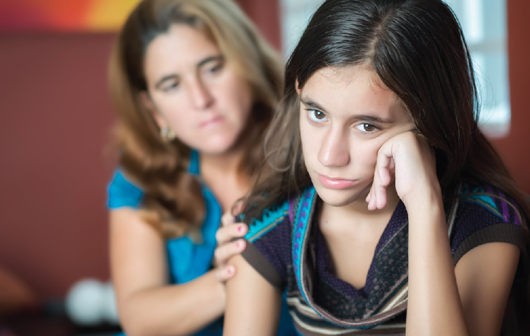Dealing with Bullies
How Metro Atlanta Schools Are Tackling The Issue

By Laura Raines
The educational experience is constantly changing, as technology
and teaching methods evolve. But one aspect of school life remains as present as reading, writing and arithmetic—bullying. It’s a problem that torments many children, and can have lasting effects long beyond a child’s school years, including depression, poor self esteem, trust issues, and aggression. Fortunately, public and independent Atlanta schools have procedures in place to deal with the issue, and aim to tackle the problem through their curricula as well.What is Bullying?
According to the most recent statistics from the Centers for Disease Control and Prevention, nearly 20 percent of U.S. high school students reported being bullied in school in 2013. Bullying continues to make the news—and that’s a good thing, says Chantel Mullen, formerly dean of student discipline/student relations for Atlanta Public Schools (APS), now with the Governor’s Office of Student Achievement. “Raising awareness helps. You can’t attack anything if you are not aware of it.” To that end, APS co-sponsors an annual anti-bullying summit in conjunction with Auburn University.
Attacking the problem begins with having a clear definition. The website StopBullying.gov defines bullying as “unwanted, aggressive behavior among school-aged children that involves a real or perceived power imbalance.”
Under Georgia law, the term “bullying” refers to (1) Any willful attempt or threat to inflict injury on another person, when accompanied by an apparent present ability to do so; (2) Any intentional display of force such as would give the victim reason to fear or expect immediate bodily harm; or (3) Any intentional written, verbal, or physical act, which a reasonable person would perceive as being intended to threaten, harass, or intimidate…” It covers acts occurring on school property or vehicles, at designated bus stops, at school activities, or by use of data or software accessible through any computer or computer network.
“We define bullying by Georgia’s law, and print it in our student handbooks,” says Mullen. “Our policy is no tolerance. Our students know that bullying has consequences, such as being cited and asked to sign a stay-away agreement, changes in scheduling, suspension or transfer to an alternative school.”
APS maintains an anti-bullying page on its website (atlanta.k12.ga.us), with multiple resources for students, teachers and parents. We frequently send information to our parents and teachers. Counselors discuss it with students,” says Mullen. “You can’t get too much information out about this topic.”
Teaching Positive Behaviors
Curtailing negative behaviors is necessary, but educators are finding that teaching positive behaviors and creating inclusive, supportive school environments can make a bigger impact, according to Katherine Raczynski, director of Safe and Welcoming Schools, an outreach project of the University of Georgia’s College of Education.
Many Atlanta public and independent schools have adopted “No Place for Hate” campaigns, sponsored by the Anti-Defamation League, or participated in Power Over Prejudice programs, sponsored by the Anti-Prejudice Consortium.
“The best thing we do is teach kids to see beyond stereotypes and prejudices and to learn to become leaders in solving their own problems,” says Amelia Nickerson, board president for Power Over Prejudice (POP).
Student representatives interact with one another at annual POP summits, then go back to start programs in their schools. “We ask kids what they can do, how they can take responsibility. You’d be amazed at the variety of programs they start in their own schools.”
Teaching responsibility and respect for others begins early at Johns Creek Montessori School of Georgia, where students range in age from 15 months to 6 years old. The school has policies about behavior, which teachers enforce. “But we believe in giving students the tools to deal with someone or something they don’t like,” says Denise Harold, director. “Students know … their needs can’t hurt or disturb anyone else. No one child’s needs supersede those of the community.”
Giving children responsibility for themselves and ownership of their environment, as well as modeling respect, empathy and peaceful conflict resolution, are Montessori tenets. “When children take ownership for their environment, they want to maintain a good environment,” says Harold.
The Lovett School stresses character development in its students and believes that creating the right school atmosphere is most important. It has a no-tolerance policy and addresses any reports of bullying. Every student also signs a character pledge that says he will honor the values of honesty, respect, responsibility and compassion. And counselors visit classes regularly for guidance sessions. “In kindergarten, we talk about valuing the differences in others,” says Gayle Greenwood, director of lower school counseling. “In fourth and fifth grades, when peer pressure kicks in, we discuss what it means to be a friend.”
In middle school, counselors meet with sixth-grade boys and girls separately in small groups to address bullying, body image and online etiquette. “The point is to get them thinking and talking to each other about topics that are important to them,” says middle school counselor Sara Friedman.
Character and values are also reinforced in class through book discussions, papers and projects. “Anti-bullying can’t just be a sign or a slogan,” says director of middle school counseling Chase Jones. “It has to be in the fabric of your school culture.”
What Parents can do About Bullying
1. If you suspect your child is being bullied, ask him—he may not volunteer the information.
2. Look for warning signs. He may show decreased interest in school, have angry outbursts, or even hurt himself.
3. If he tells you he’s being bullied, listen calmly, without getting upset, and offer your support.
4. Help him figure out appropriate responses to the bullying behavior. It’s important that he feel as if he’s handling the problem himself, rather than you “solving” it for him.
5. If the bullying behavior is severe enough, contact the child’s teacher, counselor or principal and work with them to determine what next steps may need to be taken.








